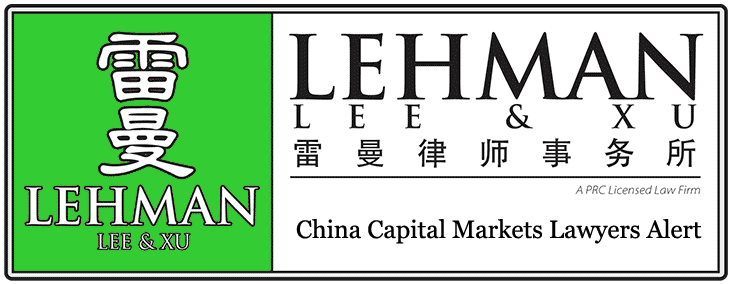

 |
|
LEHMAN, LEE & XU China Lawyers
|
|
China Capital Markets law In The News
|
|
December 2014
|
The China Law News keeps you on top of business, economic and political events in the China. |
|
|
|
In the News |
China FTA will spur ‘seismic’ capital shift |
The relatively weak capital flows between Australia and China should be revamped by the China Australia Free Trade Agreement, as the sophisticated Australian managed funds system becomes more involved in the Chinese system. Financial linkages between the two countries were recently enlarged alongside the expanded trade deals. The People’s Bank of China (PBC) extended its Renminbi Qualified Foreign Institutional Investor (QFII) trial to Australia with an initial quota of $9.3 billion, and announced that Sydney would be the site of the latest RMB clearing bank, to go with those already established in London, Luxembourg, Frankfurt and Seoul. The Reserve Bank of Australia says China’s economic liberalisation program - and in particular the internationalisation of the RMB - is part of a change to global and Australian capital markets which the RBA says could be ‘’seismic’’. Deputy governor of the Reserve Bank, Philip Lowe, has explained the QFII impact on Australia as, “an important next step in facilitating cross-border RMB-denominated investment transactions between our two economies. Australia has a relatively large and sophisticated private funds management sector, there is significant potential for growth in this area.” Capital flows between China and Australia have not been as developed as trade flows. While China accounts for around 40 per cent of Australian exports, HSBC Australia notes that in 2013, just 3.7 per cent of Australia’s investment abroad went to China, while 3.4 per cent of foreign investment in Australia was from China (including Hong Kong). Of the $91 billion of net foreign investment into Australia in 2013, about 9 per cent came from China, up from zero in 2005. Such a low base of capital flows has largely been a function of Beijing’s managed economy. But the QFII will allow Australian-based financial institutions to invest in mainland China’s capital markets. The institutions will be able to apply to the Chinese government for an investment quota, so they can invest in Chinese bonds and equities using RMB obtained in the Australian market. The cycle of RMB sourced in Australia, used to invest in China or pay invoices, is expected to grow very quickly and strengthen the quality of security of capital flows between the two countries. With an Australian superannuation industry of $1.5 trillion (funds-under-management), a QFII quota of $9.3 billion is not large, however it represents a step in China’s economic liberalisation, in which Australia will play a role of not only investor in Chinese capital markets, but as developer of offshore RMB markets. Spiro Pappas, executive general manager of global institutional banking at NAB, says that the QFII is an important recognition of Australia’s managed fund industry. He says the announcements on QFII and the RMB clearing bank are acknowledgements that Australia will be part of Chinese liberalisation plans, however he says there are practical applications of QFII to Australian fund managers. “Australia’s private pension system will be twice the size it is now, by 2020,” says Pappas. “These funds need to diversify not only by asset class, but by geography. They want to be invested in the region’s dominant economy and the QFII is the starting point for what will probably be a typical investment for Australian fund managers a decade from now.” He says the QFII gives Australian fund managers an opening into the Chinese bond and equities markets, while also building better trust and more efficient capital flows between China and Australia. When Australian retirees have lumps of their retirement savings tied up in China’s capital markets, there is inevitably mutual trust being developed. He says the RMB initiatives and the QFII are “small steps in the right direction” which should give Australian businesses and financial institutions some comfort. |
|
|
|
|
| Proud Member of |